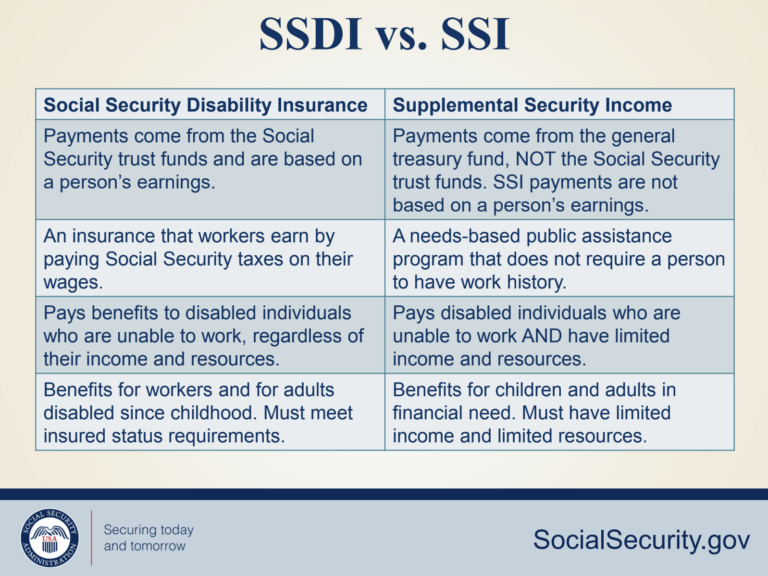Social Security (SSI/SSDI)
Disclaimer: The following information provided here is for informational and educational purposes only and is not a substitute for legal or medical advice. All information sourced from www.ssa.gov.
Overview

The Social Security and Supplemental Security Income disability programs are the largest of several Federal programs that provide assistance to people with disabilitiesThe Americans with Disabilities Act (ADA) defines a person with a disability as a person who has a physical or mental impairment that substantially limits one or more major life activity. This includes people who have a record of such an impairment, even if they do not currently have a disability. It also includes people who do not have a disability but are regarded as having a disability. The ADA also makes it unlawful to discriminate against a person based on that person’s association with a person with a disability. More. While these two programs are different in many ways, both are administered by the Social Security Administration (SSA) and only people who have a disability and meet medical criteria may qualify for benefits under either program.
Social Security Disability Insurance (SSDI) pays benefits to you and certain members of your family if you are “insured,” meaning that you worked long enough and paid Social Security taxes.
Supplemental Security Income (SSI)SSI is a federal cash assistance program for those with limited income AND are either 65 years old or older or blind or disabled. Adult SSI beneficiaries must have limited income and resources ($2,000 in assets); parents’ income does not count for adult applicants. You do not have to have any work history. Monthly benefit payments are determined by the current benefit rate ($750 a month in 2018), minus any “countable income.” More pays benefits based on financial need.
SSDI provides benefits to disabled or blind people who are “insured” by workers’ contributions to the Social Security trust fund. These contributions are based on your earnings (or those of your spouse or parents) as required by the Federal Insurance Contributions Act (FICA). Title II of the Social Security Act authorizes SSDI benefits. Your dependentsA dependent is someone who is sustained by another person, such as a child supported by his or her parents. More may also be eligible for benefits from your earnings record.
Supplemental Security Income (SSI)
SSI is a federal program that provides monthly payments to people who have limited income and few resources. It is meant for people who are 65 or older, as well as for those of any age, including children, who are blind or who have disabilities.
Applying for Disability Benefits
- Apply online.
- Call 1-800-772-1213 to make an appointment at your local office.
When to Apply for Disability Benefits
Apply as soon as you become disabled. Processing an application for disability benefits can take three to five months, but may be processed faster if additional requests for information are handled in a timely manner.
How to Apply for SSI (Under Age 18)
- Schedule an appointment with Social Security. Call between 7 AM and 7 PM, Monday through Friday, or contact your local Social Security office.
- Complete the online Child Disability Report.
How to Apply for SSI (Adult)
You can begin the process and complete a large part of your application online. You may be eligible to complete your application online if:
- You are between the ages of 18 and 65
- You have never been married
- You are a U.S. citizen
- You haven’t applied for or received SSI benefits in the past
- You are applying for Social Security Disability Insurance at the same time as your SSI claim
Requirements
Adults:
- You must have limited income and few resources.
- You must be age 65 or older.
- You must be totally or partially blind or have a medical condition that keeps you from working and is expected to last at least one year or result in death.
Children:
- If under 18, the child must have a physical or mental impairment (or combination) that results in marked or severe limitation in functioning.
- The child must be either blind or disabled. If the child is blind, they must meet the same definition of “blind” as applies for adults.
- Conditions must be expected to last at least 12 months or result in death.
Age 18 Foster Children:
- The child must live in a foster care situation.
- The child must allege blindness or disability.
- The child must appear likely to meet all of the non-medical eligibility requirements when foster care payments terminate.
- Foster care payments will cease within 180 days of the application filing date.
- The child is within 180 days of losing foster care eligibility because of age.
SSI Determination for Children Turning 18
- A new disability determination is made using the adult rules.
- Income and resources of parent(s) are no longer counted for eligibility.
- If the child continues to live with parent(s) but does not pay for food or shelter, a lower SSI payment may apply.
- An SSI application can be made as early as the day of the 18th birthday.
Next Steps
- Your application will be forwarded to the state Disability Determination Services (DDS)A division within the Virginia Department of Behavioral Health and Developmental Services (DARS) that works in partnership with the Social Security Administration and the Virginia Department of Social Services to make decisions on disability claims for benefits under the Social Security Disability Insurance, Supplemental Security Income, and Medicaid Programs based on medical and psychological evidence. More agency.
- The DDS will contact medical providers to obtain medical records.
- The DDS may ask for additional information about how your condition(s) affect daily activities.
Social Security Disability Insurance (SSDI)
Applying for Disability Insurance
- Apply online.
- Call 1-800-772-1213 to make an appointment at your local office.
When to Apply for Disability Benefits
Apply as soon as you become disabled. Processing an application for disability benefits can take three to five months, but may be processed faster if additional requests for information are handled in a timely manner.
When Benefits can be Received for the Family
Spouse:
- At age 62
- At any age if caring for child who is under 16 or disabled
- Divorced spouses may qualify
Child:
- Not married under age 18 (under 19 if still in high school)
- Not married and disabled before age 22
Next Steps
- Your application will be reviewed to make sure you meet some basic requirements for disability benefits.
- Your application will be checked to see whether you worked enough years to qualify and evaluate any current work activities.
- If you meet these requirements, your case will be forwarded to the Disability Determination Services office in your state.
Disability Determination
The Disability Determination Services Office completes the initial disability determination decision. Doctors and disability specialists in the state agency will ask your doctors for information about your condition(s). They’ll consider all the facts in your case and will use the medical evidence from your doctors, hospitals, clinics, or other institutions where you’ve been treated.
A disability determination is then made by following a five-step process:
- Are you working?
- Is your medical condition “severe”?
- Does your impairment(s) meet or medically equal a listing?
- Can you do the work you did before?
- Can you do any other type of work?
Once a decision has been made, you will receive a letter regarding the determination. If approved, the letter will show the amount of your benefit, when your payments start, and your reporting responsibilities. If not approved, the letter will explain why and tell you how to appeal the determination if you don’t agree with it.
